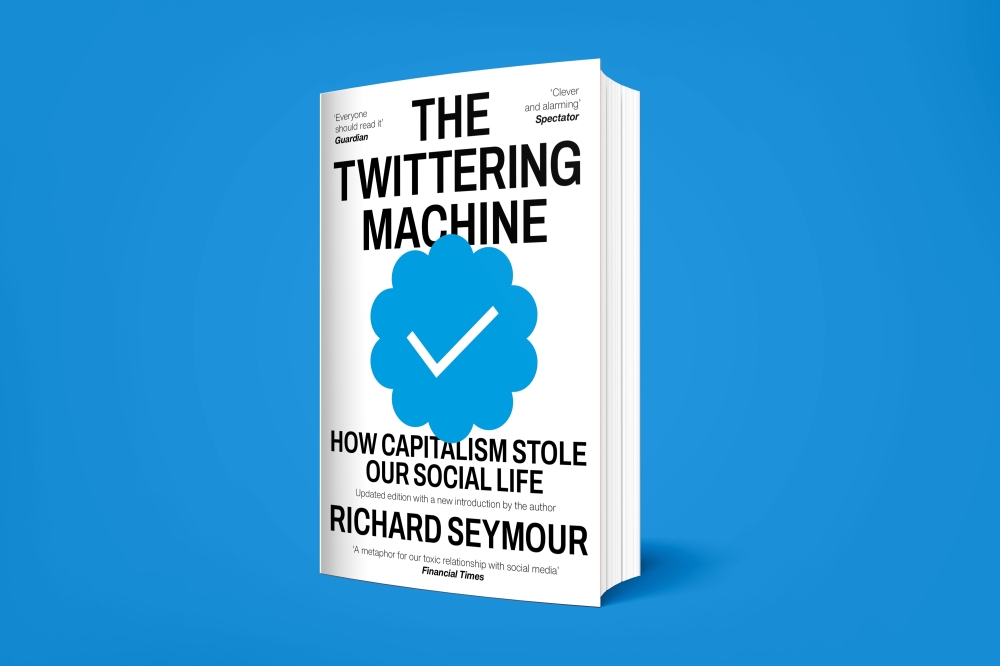

Few figures have embodied the age of social media as fully as Donald Trump — the world’s first “Twitter President.” Since his first tweet in 2011, Trump used the platform not only to build a political identity, but to command attention in a space designed for spectacle and confrontation. His presidency, and the social media strategy that fuelled it, raises a deeper question: is Trump a sign of what’s to come, or simply a temporary shock in a shifting world?
In The Twittering Machine (2019), Richard Seymour explores the evolution of social media from a tool of communication to a powerful industry shaped by capitalism and control. Borrowing its title from a 1922 painting by Paul Klee, the book argues that platforms like X (formerly Twitter) and Facebook are not neutral spaces. Rather, they are built to capture attention, encourage addiction and manipulate users for profit and influence.
Seymour shows how social media no longer fosters organic, meaningful dialogue. Instead, it creates an environment of superficial connection and toxic engagement. Attention is the currency, and controversy is the engine. The platforms reward rage, mockery and spectacle — fuel for what Seymour calls a “machine” that generates cruelty, division and distortion.
Trump mastered this system. His online presence wasn’t just political — it was performative, provocative, and perfectly suited to a space that values impact over substance. His presidency, as Seymour suggests, wasn’t simply a result of political trends but also of the very design of social media itself.
My return to Seymour’s work was prompted by two things. First, a column published in Oman Daily (March 8), which reflected on the fading role of the intellectual. It noted that today’s thinkers no longer lead public opinion, but instead watch from the sidelines, overwhelmed by a digital space that celebrates “influencers” over minds.
The second was a conversation with a friend, where I found myself explaining why I had all but abandoned social media for over a year. In the eyes of many, absence from platforms like X or Facebook is equivalent to nonexistence. But this belief — that true relevance requires constant online visibility — is deeply flawed. Many meaningful voices choose to stay away, resisting a culture that values noise over depth.

I wrote about this dilemma in an earlier essay titled Twitter Against Twitter (April 2023, Al Falaq). Inspired by critics like Noam Chomsky and Roland Barthes, I questioned the takeover of public discourse by corporate platforms. Elon Musk’s acquisition of Twitter and the so-called “Twitter Files” revealed troubling signs of manipulation, including during moments of crisis like the war on Gaza, when content was filtered or suppressed.
As Seymour warns, social media platforms are not open forums — they are industries of control. They shape public perception, filter content and steer conversations to serve their interests. Instead of open dialogue, we now face echo chambers and hostile spaces where thought is drowned by noise and engagement becomes exhausting and shallow.
Even time — our most precious resource — is consumed by the endless scroll. For intellectuals, the challenge is not just keeping up, but making sense of a fragmented and fast-moving landscape. Most either burn out trying or retreat entirely, only to be dismissed as detached.
Today, social media is rarely a space for building knowledge. It has become a stage for self-promotion, quick reactions and empty trends. Even discovering new, thoughtful voices often requires personal connections — returning us to the old gatekeeping systems. Users are left to choose between isolated bubbles or aggressive, chaotic arenas, where depth is buried beneath spectacle.
Are we trapped in this cycle? Is the screen destined to remain a space for control rather than freedom? Maybe not. Despite the noise, some still fight to share ideas, spark thought and imagine a better digital future. Perhaps, beyond the moment’s glare, lies a wider horizon waiting to be reached.
Translated by Badr al Dhafari
The original version of this article was published in Oman Arabic newspaper on March 23, 2025
Oman Observer is now on the WhatsApp channel. Click here


